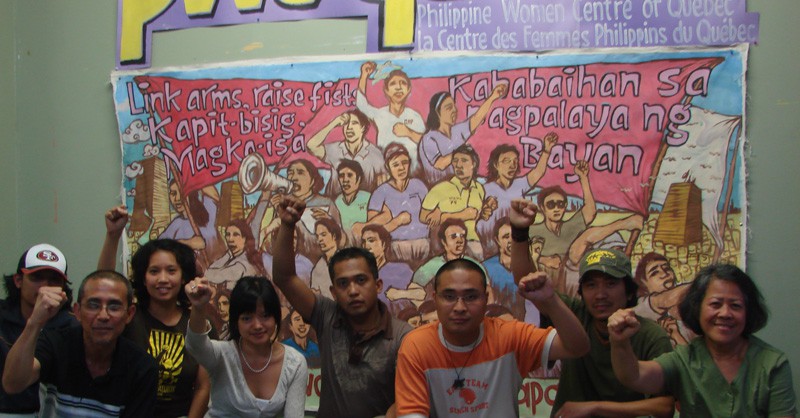
“The live-in caregiver program is an urgent issue that women in Canada need to look at collectively,” says Cecilia Diocson, right.
As part of an ongoing project, Making the Links Radio is conducting interviews and producing radio shows focused on immigrant communities in Canada. From these conversations, we bring you glimpses of three important sites of struggle against the exploitation and marginalization of (im)migrant groups in Canada: the Philippine Women Centres, the Workers’ Action Centre, and Justicia for Migrant Workers.
What are the biggest issues facing migrant and precarious workers today?
*Karen Dick, Workers’ Action Centre Toronto:*
Workers are at their limits. People are working two or three jobs just to get by, and still making poverty wages. I’d say for 90 per cent of the people who come through here, their issue is unpaid wages. Sometimes employers just decide to not pay a worker at all.
When people come in, we talk about basic rights; there is an educational aspect there. It’s easy to talk about rights, but much more difficult to get them enforced, or even to get people to assert their rights. We are trying to motivate people to claim better wages and better working conditions.
Many of the people who call our centre are temp workers. People start as temp workers and hope to eventually become permanent, but that just isn’t how it works. People have been temp workers for three or four years; they’re “perma-temp”, working alongside permanent workers for less pay and no benefits.
When there are repeat violations, our labour laws don’t even address the issue of precarious work. We have outdated labour laws, developed 30 or 40 years ago. The temp workers who are part of our centre are trying to push the legislature to expand these laws written in the ’60s and ’70s, looking at equal pay for equal work—-basically for equalization of pay and to regulate the industry. Temp workers want to see better working conditions.
Nadira Gopalani, Karen Dick and Minthura Wynn at the Workers’ Action Centre in Toronto.
-*Cecilia Diocson, Philippine Women Centre:*_
We need the Canadian women’s movement to focus on the issues of immigrant women. Filipino women are the third-largest immigrant community in Canada today, and the live-in caregiver program is an urgent issue that women in Canada need to look at collectively. The Live-In Caregiver program is a program of the federal government—-Citizenship and Immigration Canada and Human Resources Development Canada. It is a very exploitative program—-it dehumanizes our community, it marginalizes our community; it actually destroys the relationship between the members of the family because of its nature, because of its policies.
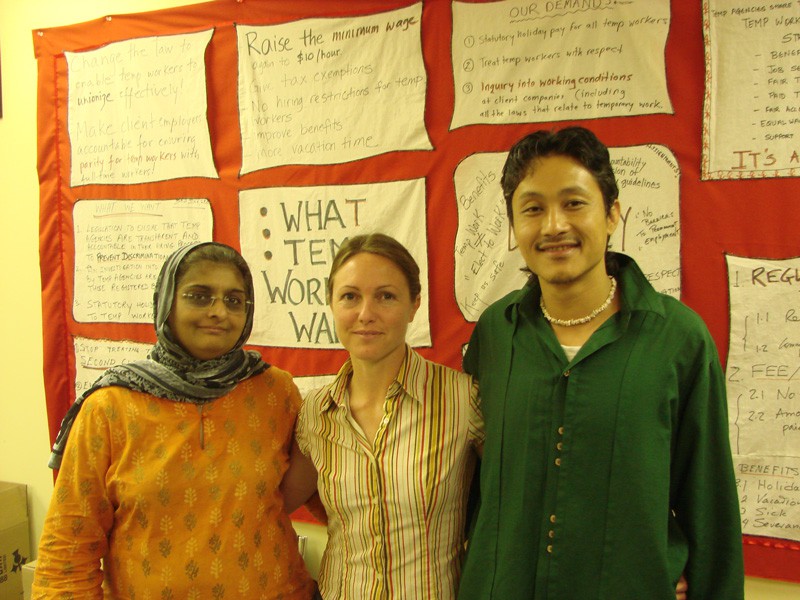
The regulations under which the women work create a very exploitative and difficult situation. It is making Filipino women into modern slaves; it is having a huge impact on both the lives of women and the greater Filipino community.
The Philippine Women Centre has been working to raise public awareness of the program, and to empower the women so they can continue to resist the oppression they face, including non-payment of their work, long hours, and many different forms of violence. It is really important to link this work to the mainstream women’s movement, and to trade unions, where there are active women’s committees. Canadian women must understand the reality and the experiences of this marginalized group of women.
*Adriana Paz and Erika del Carmen Fuchs, Justicia for Migrant Workers B.C.:*
The government is biased towards the employers. They say as much. They are on their side. We are pushing, but the government seems to only be listening to the employers and not taking the role they should take, which is to look out for the most vulnerable. Workers are not part of the equation; they are left out. Their needs, their subsistence, their well-being, their survival is the last thing on the agenda.
Workers in the Seasonal Agricultural Workers program are never consulted, and their needs are never taken into consideration. No gratitude, economic or otherwise, is given to these workers who have been supporting our economy for 30 or 40 years. And when they become ill or die there is no support from the Canadian and the Mexican government. This is absolutely unacceptable; we need to put workers back in the equation. The balance is tipped in favor of employers and companies, and this is a situation that has to change.
Unions can play an invaluable role in changing this situation. We need to empower the workers to organize. And we need to challenge the union model on how migrant workers need to be organized. They can eventually organize themselves, but at the beginning they need backup services such as community support, legal systems, education. But because of the farms being so isolated, we don’t always know about their organizing, and obviously the workers don’t have the resources. Support can come at different levels, not only providing services, but providing education, training, creating a space where the workers can do it themselves.
Canadians need to pay attention to migrant workers, because as migrant workers’ rights are cut, so are the rights of Canadians—-and when they suffer, the rest of Canada does as well. Canadian workers need to protect the rights of these workers in order to protect their own rights.
“As migrant workers’ rights are cut, so are the rights of Canadians—and when they suffer, the rest of Canada does as well,” say Erika Carmen Fuchs and Adriana Paz of Justicia for Migrant Workers
What do you see as the roots of these struggles?
*Cecilia Diocson, Philippine Women Centre:*
The Philippines is the number one migrant nation in the world. About 10 million Filipino people are working overseas, and 65 to 70 per cent are women. It is important to look at why women are leaving the country. About 3,000 people leave every day and the majority are women. They go out as domestic workers, as live-in caregivers, as entertainers in Japan and Hong Kong and other parts of the world, as mail-order brides, and they are being trafficked in various parts of the world as prostitutes.
It is important to understand the economic and political situation over there. There are not enough opportunities for women to work in the Philippines. There is very high unemployment. They graduate as nurses, but they have to leave the country and work as live-in caregivers in Canada. And there are the extrajudicial killings in the Philippines, where activists are being murdered, such as one of our own women’s movement leaders. (To take action on these killings or to learn more, go to www.pinoyhr.net/list_killed.php.)
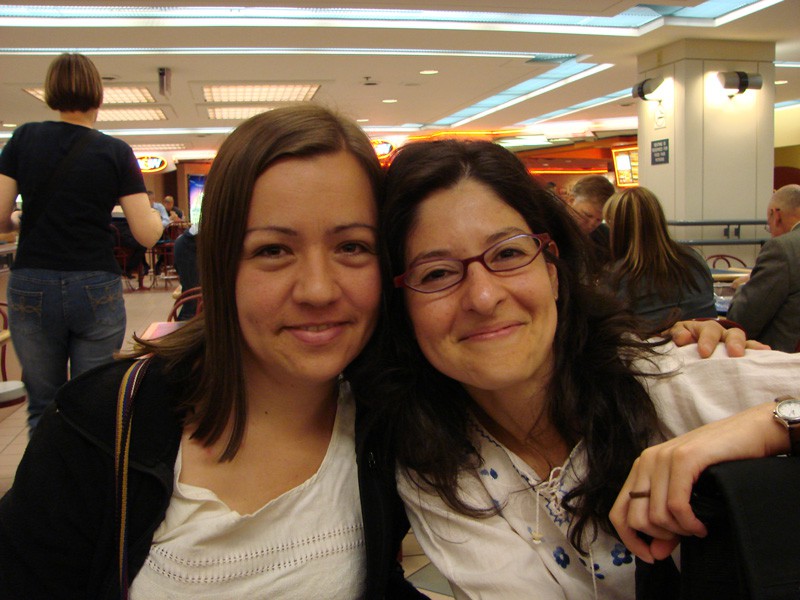
The Philippines is a third world country and is under-developed, but if you look at the resources of the country, including its people, it is a very rich country. If you look at the nature of the migration, it is forced migration, forced by the high unemployment. There are not enough industries to absorb the workers. Many foreign investors are in the Philippines to plunder the resources. Many Canadian companies are active in the Philippines.
*Karen Dick, Workers’ Action Centre, Toronto:*
We know that the people who make the lowest wages are women and recent immigrants. A large percentage of workers are making less than $10 an hour. What we see are people working a day job, delivering pizzas in the evening, and then delivering papers in the middle of the night—-just trying to make ends meet, and still living below the poverty line. Low wages are a huge issue.
Another issue is the precarious nature of work. People work for temp agencies with very unpredictable hours, alongside permanent employees but with lower wages and no benefits. These people are being misclassified as “self-employed” when they’re really among the most exploited segments of the workforce. Part-time work, contract work, that whole precarious nature of work makes it very difficult for people to survive.
The third issue is the lack of enforcement of our laws, which is huge. We have a set of outdated laws that aren’t even enforced. There are all these gaps in our laws that act as incentives for employers to break the rules. Employers feel very confident breaking the law. Workers go from workplace to workplace, seeing the same violations, and they have no faith in a system that is not protecting them.
*Adriana Paz and Erika del Carmen Fuchs, Justicia for Migrant Workers B.C.:*
La justicia means “justice” in Spanish. As the majority of migrant farm workers are Latino, we like to connect to the countries of origin and the struggles going on there, because migration has roots and causes. Both the Canadian and Mexican governments are complicit in this migration process; they act as managers or controllers of this migration and contribute to the exploitation of workers.
We are trying to build connections with the workers’ families and home communities, because organizing isn’t just about improving conditions when people come to work in Canada, but also looking at why they are coming here, and at how to support social justice movements in their home countries as well.
Certainly, migration should be an option. But right now what we’re seeing is forced migration. Mexican and other migrant farm workers are being forced to come to Canada out of economic and social hardship.
About the organizations:
Workers“š’ Action Centre (Toronto, ON)
The Workers’ Action Centre was formed in the spring of 2005 when TOFFE (Toronto Organizing for Fair Employment) merged with the Worker’s Information Centre. The Workers’ Action Centre is a worker-based organization committed to improving the lives and working conditions of people in low-wage and unstable employment.
As the Workers’ Action Centre’s mission statement declares, “People who are directly affected by poor working conditions should be the ones providing leadership in the struggle for fairness and dignity at work.” To this end, the Centre takes leadership from recent immigrants, workers of colour, women, and youth and workers in precarious employment.
www.workersactioncentre.org
Philippine Women Centres (PWC)
The Philippine Women Centres (PWC) are located in Vancouver, Winnipeg, Toronto and Montreal.
The idea of a Philippine Women Centre was conceptualized in 1986 by a group of Filipino women, including domestic workers, who were connected with the B.C. Committee for Human Rights in the Philippines.
PWC initially organized in the Vancouver area to gain a deeper understanding of the Filipino community, particularly the situation of the increasing number of Filipino domestic workers, whose presence in Canada is seen as an urgent human rights issue. PWC believes that the migration of Filipino domestic workers to Canada has roots in the political and economic crises in the Philippines.
PWC was built on the experiences and needs of Filipino women, and continues to strengthen and support the community through education, advocacy work and organizing.
kalayaancentre.net/pwcofbc
Justicia for Migrant Workers (J4MW)
J4MW is a volunteer-driven, non-profit collective comprised of committed activists from diverse backgrounds, including labour activists, educators, researchers, students and youth of colour, based in Toronto and Vancouver.
J4MW strives to promote the rights of seasonal Caribbean and Mexican migrant workers who participate in the federal government’s Seasonal Agricultural Workers Program, believing that migrant workers deserve work with dignity and respect.
www.justicia4migrantworkers.org
The radio series from which these interviews are drawn is part of a project of the Canadian Labour Congress called Changing the Canvas, which seeks to develop strategies to better integrate (im)migrants into the Canadian labour force with equity and dignity.
The full Making the Links Radio series, called Changing the Canvas – Immigrant Voices and Advocacy, can be heard on www.makingthelinksradio.ca


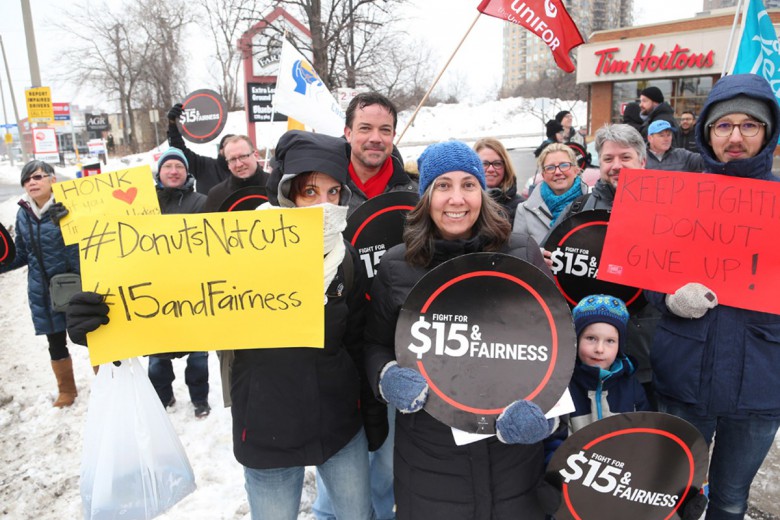

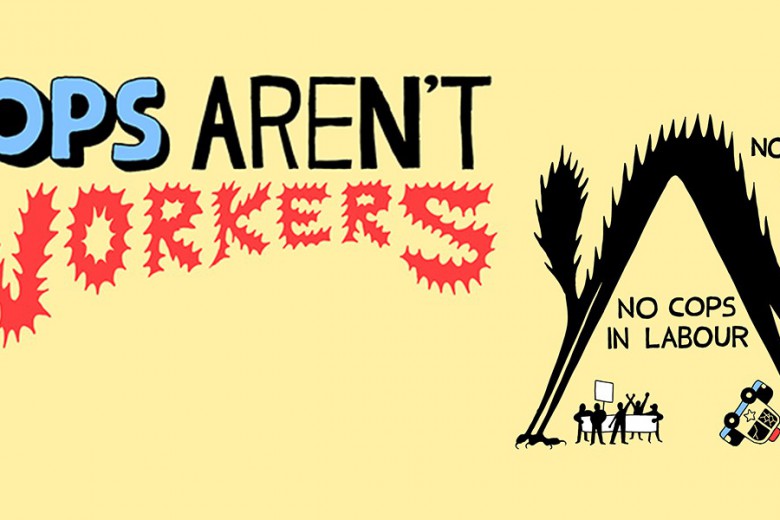
_copy_780_520_90_s_c1.jpg)
